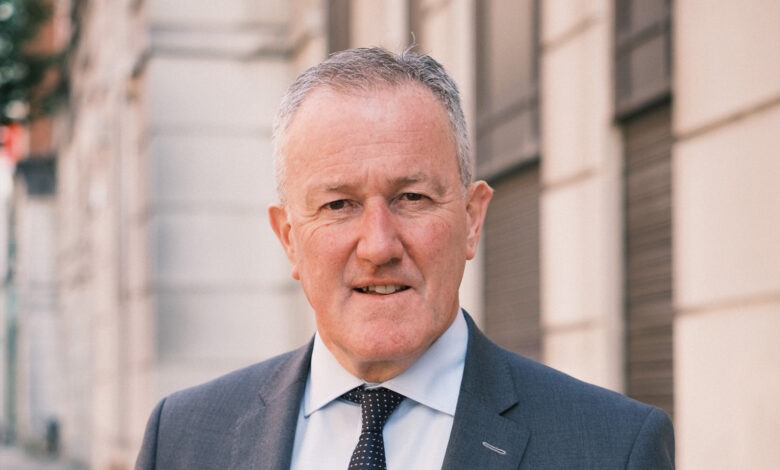Economy Minister Conor Murphy MLA: ‘A mood of optimism’

Fresh from setting out his four key priorities as part of a new economic mission and the publication of action plans to grow seven priority sectors, Economy Minister Conor Murphy MLA talks to David Whelan about his ambitions in a shortened mandate.
Mid-morning in late July and Minister for the Economy has just returned from launching a £46 million agri-food investment initiative with Invest NI, having already visited a local business in Lurgan, County Armagh. It is just one of a flurry of initiatives launched by the Minister six months since taking up office, which correlates with his stated desire to “hit the ground running”.
An interview with agendaNi is just one of several back-to-back meetings on what is said to be a typical day for the Minister who is early in his tenure and cognisant that less than three years of the mandate remain.
Asked about the short lead-in time to his new economic mission, which was launched just a fortnight after the Executive returned in February 2024, Murphy indicates that his party’s much anticipated selection of the economy portfolio as its first choice in a reformed Executive necessitated much preparatory work to be carried out in advance.
“We [Sinn Féin] had a sense of the timeframe involved and know what we want to achieve,” he explains. “Having signalled our intention to take the economy portfolio as a party, we had done a lot of engagement on our policy priorities to ensure that we hit the ground running from day one.”
Also defined by the timeframe, seemingly, is the Minister’s approach to delivering his economic policies. A February 2024 address to the Northern Ireland Assembly outlined four objectives of the Minister’s economic vision, namely:
- to create good jobs;
- to promote regional balance;
- to raise productivity; and
- to reduce carbon emissions.
The Department for the Economy has appointed independent experts to each of these objectives, whom the Minister says will act as “critical friends” in advising how, at a strategic level, these objectives should be pursued, and to help monitor progress.
“We have to try and stretch and make best use of the resources which are currently available, while ensuring we get the best outcomes.”
Economy Minister Conor Murphy MLA
While these objectives may form part of a future economic strategy, at present the Minister signals his intention not to publish a new economic strategy, but instead to bring forward a business plan in autumn 2024, which will cover the remainder of the mandate.
“In the autumn, we will be bringing forward a sub-regional economic action plan, in the context of an overarching business plan, which reflects our approach for the years ahead,” he explains. “This department had a variety of strategies, some of which have had many objectives, and some of which have had none. Given the shortness of the mandate, we took the approach that to revisit and then consult on those many strategies would leave little to no time for delivering improved outcomes.”
Murphy indicates that a call for a better strategic focus from the Department and its arm’s length bodies – as per the critical independent review of Invest NI in 2023 – as well as engagement with key stakeholders, was central to his decision to navigate towards a four-pillared economic vision.
At the end of June 2024, the Minister published seven sectoral action plans, covering areas such as fintech, software, and screen industries, which he believes are designed to “enhance growth across seven of the North’s most innovative, productive, and export-orientated economic sectors”.
Good jobs and productivity
In May 2024, unemployment in Northern Ireland reached a record low of 2 per cent. However, the headline figure masks an undercurrent of long-standing challenges, not least that the region has the joint highest proportion of low-paid jobs across the UK. In addition, some 27.4 per cent of the population was deemed economically inactive – and therefore outside the labour market – in March/May 2024, well above the 22.1 per cent UK average.
As a result of these challenges and more, productivity in Northern Ireland is deemed to be 11 per cent per cent lower than the UK average, and almost 20 per cent lower than in the Republic.
Whereas previous economic policies tended to focus on job creation figures, Murphy has indicated a desire to ensure that better and more productive jobs are part of Northern Ireland’s economic future.
“We were [historically] selling ourselves as a low wage economy,” he suggests. “That means attracting jobs that are not stable, well paid, or necessarily highly skilled. That is in contrast to sectors of our economy that are doing well, and which depend on having a highly skilled workforce.”
In July 2024, the Economy Minister announced a consultation on good jobs and improving workers’ rights, identifying the modernising of the employment law framework as one of his key priorities.
In addition, the Minister is clear that improving the skillset of the Northern Ireland labour market is a key element of increasing foreign direct investment and ensuring good job creation. However, he is also aware of the benefits to both existing and new indigenous businesses.
Outlining his belief that productivity is a fundamental driver of overall living standards, he says: “We want to support people who have innovative ideas to start building those businesses of the future. Equally, we want to equip those existing businesses with the tools to upskill their workforce, so that they can improve their productivity, enter export markets, and take advantage of the dual market access the North now has.”
On whether the current budget settlement was enough to deliver the step changes needed for both improved productivity and the growth of good jobs, Murphy describes the financial situation as “challenging”.
“Primarily, funding for work in these areas was sourced from European funding, which was stopped, and not replaced in full, as first pledged, by the then-Tory government. That has left a significant gap, and one we are attempting to bridge as much as possible, as evidenced by the £12 million ring fenced Skills Fund which I announced at the start of July.
“The Executive has set itself the task of getting our fiscal framework correct, which we would hope would yield more support. However, that will not happen today or tomorrow, and that is why we are seeking to plug those gaps.”
Emphasising that economic growth is an Executive-wide priority, albeit led by his department, he points to wider investment plans, which can have a positive impact on the productivity challenge.
“If, for example, we invest in childcare, as has been set out, then there is an economic benefit to allowing more people with caring responsibilities to re-enter the workforce. Work by the collective Executive departments can all play a role in the ambitions of our economic vision. We have to try and stretch and make best use of the resources which are currently available, while ensuring we get the best outcomes.”
While no clear commitment has been given, Murphy describes party colleague and Finance Minister Caoimhe Archibald MLA’s initial conversations with the Treasury under the new Labour government as “positive” and expresses his hope for an “improved picture” in relation to funding.
“We will continue to argue the case. There is a recognition from London that we are underfunded according to our need. We need to correct that and rebalance it,” he states.
Regional balance
Another criticism levelled at Northern Ireland’s economic development agency, Invest NI, contained within the independent review, was the finding that “the regional offices of Invest NI are underutilised with staff and decision-making largely centralised in Belfast”.
While Northern Ireland’s economy often sits as a laggard in many metrics when compared to other regions of the UK and the Republic, the local economy itself also displays a lot of disparity. The employment and economic inactivity rate gap between the highest-performing regions and the lowest-performing regions has been recorded as high as 10 per cent in some instances.
Acknowledging the criticism of Invest NI and identifying a pre-existing “Belfast-centric” approach to economic development, Murphy says that his ambition to improve regional balance is centred on amplifying local voices.
“We want to empower local areas to have an input into their own economic development, but also to ensure that their voices are heard in policy development across government,” he explains.
“I do not believe good policy is sculpted in a central building and then delivered down. We want to encourage that two-way exchange and genuinely empower local voiced to contribute to the discussion for the benefit of their own area.”
Murphy believes that such an approach will also help with the Department’s efficient use of finances. “Recognising the financial challenges in delivering the levels of support needed, a focus of resources in areas where it will have the most impact, and the greatest chance of fostering further investment, will give us the best outcomes,” he states.

Net zero
The Minister is cognisant of the potential of his fourth economic priority – reducing carbon emissions – to act as a vehicle to deliver the other three pillars. More than that, net zero by 2050 is a legal requirement following passage of the Climate Change Act and Murphy believes the focus on the transition could be a lever of success.
“We live on an island at the edge of the Atlantic Ocean meaning that we have significant renewable energy resources at our disposal. Our all-island electricity market, coupled with strong linkages and shared ambitions with the Dublin Government means that we have a broad ambition to deliver a sustainable energy system on the island, which is not subject to the variations and outside influences associated with imported fossil fuels.
“By establishing a goal of delivering a sustainable and secure supply of renewable energy, we can create a lot of opportunities within various sectors of our economy. For example, we have a manufacturing sector with world-leading skills and that sector is closely linked with our academic sector, which offers great opportunities for innovation in the sectors that we are exploring, not only wind, but also for geothermal, biomethane, and hydrogen. There is a significant opportunity for us to become world leaders in those areas,” he states.
In the recent past, Northern Ireland was viewed as a world leader in the generation and system penetration of renewables via onshore wind. However, inertia, not least because of the stop-start nature of the Stormont institutions, has seen the region lag behind neighbouring countries. In 2022, over half the electricity used in Northern Ireland was from renewable sources, but by March 2023, that figure dropped by over 5 per cent, while Britain and the Republic achieved new records of renewable generation.
Asked whether there is a risk that Northern Ireland is not moving fast enough to fully capitalise on the opportunities that exist, the Minister acknowledges the need to move quicker, pointing to an appetite to do so within the Department for the Economy and among its various stakeholders.
“I think we are well placed in that we are relatively small,” he explains, pointing to work already underway to harness the connectivity between some of Northern Ireland’s most important economic sectors.
In March 2024, the UK Government published plans to support the creation of a £150 million enhanced investment zone (EIZ). The Economy Minister has indicated a preference that the initiative is used to “pump prime” green technologies and skills for a green economy.
“Done right, the transition to a greener and more sustainable economy can be a just transition that also generates prosperity for all. This sector will help drive forward my economic priorities of improved regional balance and productivity, good jobs, and decarbonisation,” he says.
“Of course, we have to move quicker than has been the case if we are to meet the targets, but significant opportunities exist and there is an appetite among industry, academia, and government to try to come together to make sure we avail of those opportunities in a timely manner.”
Optimism
Asked to outline what success over the next year might look like, Murphy says that he aims to deliver progress in each of the four economic priorities.
“We want to move closer to our net zero targets and we want to strengthen regional voices with the overall aim of improving the regional balance of our economic growth. Low productivity has been a long-standing issue and not something we will solve overnight but certainly we believe we have the right focus and are setting the right direction to improving that productivity and the creation of good jobs.
“In the year ahead, we are looking for the direction of travel to become very obvious and very sustainable. Undoubtedly, particularly within the private sector, I have encountered a mood of optimism upon taking up the role, despite the challenging public financing situation. Businesses are keen to invest in their skills, their workforce, and their plant and infrastructure.
“People are very keen to be on this journey with us and there is an optimism there that gives me hope for progress over the next number of years,” he concludes.





